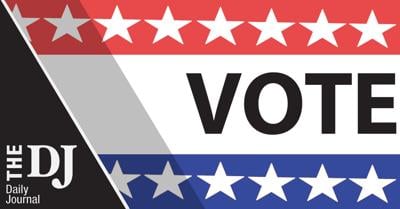San Mateo County voters will decide upon revenue streams, term limits and more through proposed city measures on the November ballot.
As city budget deficits abound, many cities across the Peninsula are asking voters for consideration of adjustments to revenue streams as income sources, such as property-tax-in-lieu-of-vehicle license fees, were recently put in a precarious position.
Belmont, Foster City, Redwood City and South San Francisco all have proposed their respective updates to their current business license tax models. All would require majority voter approval to pass.
In Belmont, the proposed measure looks to simplify the current “over complications” model by decreasing the categories in which a business could be defined. Businesses would pay 40 cents to $1 per $1,000 of their total receipts revenue depending on the type of establishment. Cannabis operations would pay $100 per $1,000 and businesses would be exempt if their receipts are less than $10,000.
According to a staff report, more than 60% of businesses in Belmont would see a decrease in their rates, but larger firms would likely see increases.
Efforts to make tax rates more equitable and relieve some of the burden on smaller businesses was a common motivator in updating the tax model on respective cities.
In Foster City, the current rate, 75 cents per $1,000 in gross receipts, is applied to all businesses regardless of industry or size. The new model could increase the rate for many businesses up to $3 per $1,000 depending on the businesses’ revenue. The city’s smallest business would only be subject to a minimum $100 annual tax.
The measure will also increase the cap to $250,000.
South San Francisco, on the other hand, decided to not include a cap on maximum taxes a business could possibly pay in its proposed measure, still with the intention of equitable tax rates depending on business size.
“The problem I have fundamentally with a cap is that if you go above that employee count, you are paying a lower effective rate than you should be, so the brunt of the tax will be placed on our medium-sized and on our small businesses, and that is just not fair,” South San Francisco Mayor James Coleman said previously.
Recommended for you
Otherwise, the South City measure would retain a mostly per-employee tax model, with tiered rates. Businesses with up to nine employees would have a $30 per employee rate, $45 per employee for medium sized companies — up to 99 employees — and $55 for those with 100 or more workers.
Redwood City residents will also vote on an updated per-employee tax model after considering changing to a gross-receipts model. The per-employee rates will range between $10 and $250, with the highest fee on larger businesses, and a cap of $250,000. The City Council also included a phased in approach over two years in the measure. This requires majority voter approval.
In efforts to increase revenue, cities like San Bruno and Half Moon Bay are approaching it a different way.
San Bruno is proposing a general obligation bond measure that could cost $30 for every $100,000 of assessed property value and raise about $3.1 million a year. The measure requires a two-thirds voter approval unless Proposition 5 passes, then only a 55% approval is required.
Half Moon Bay is looking at establishing a half-cent sales tax, which will generate approximately $2 million annually until ended by voters. The city proposed this measure to deal with the city’s looming $3.9 million budget deficit.
There is only one measure on the ballot pertaining to housing; San Mateo is proposing an update to previous development limits to comply with its newly established housing goals.
Residents will give their input on how the city approaches the development of housing in coming years. The measure ultimately will amend Measure Y, which was passed in 2020 to restrict height and density limits for residential buildings. The height, density and intensity limits already set would maintain throughout the city, except for 10 study areas where developments would be granted higher limits. The measure requires majority voters approval.
Other measures on the ballot pertain more toward elections.
In San Carlos, voters will consider whether the city’s treasurer should be an appointed position rather than its current elected status. In Millbrae, voters will be considering if its city councilmembers should have term limits — making it so members cannot serve more than three consecutive four-year terms.
The deadline for candidates for office to file for election was Friday, Aug. 9, with an extension to Wednesday, Aug. 14, if an incumbent does not file by Aug. 9. Go to smcacre.gov/elections/november-5-2024-presidential-general-election for more election information, including an updated candidate roster.

























(1) comment
This is easy – vote NO on any measure that looks to increase government coffers. These taxes will go mostly, if not all, to paying ever increasing pensions and benefits. Some may also go to wasteful spending and pet projects that won’t benefit the average citizen. As for height limits, the decision has already been made. Vote NO on any changes to the existing limits. Don’t worry. If you have a change of mind, I’m positive you’ll see hundreds more measures in the near and far future looking to take your hard-earned money. Same with the height limit thing.
Welcome to the discussion.
Log In
Keep the discussion civilized. Absolutely NO personal attacks or insults directed toward writers, nor others who make comments.
Keep it clean. Please avoid obscene, vulgar, lewd, racist or sexually-oriented language.
Don't threaten. Threats of harming another person will not be tolerated.
Be truthful. Don't knowingly lie about anyone or anything.
Be proactive. Use the 'Report' link on each comment to let us know of abusive posts.
PLEASE TURN OFF YOUR CAPS LOCK.
Anyone violating these rules will be issued a warning. After the warning, comment privileges can be revoked.